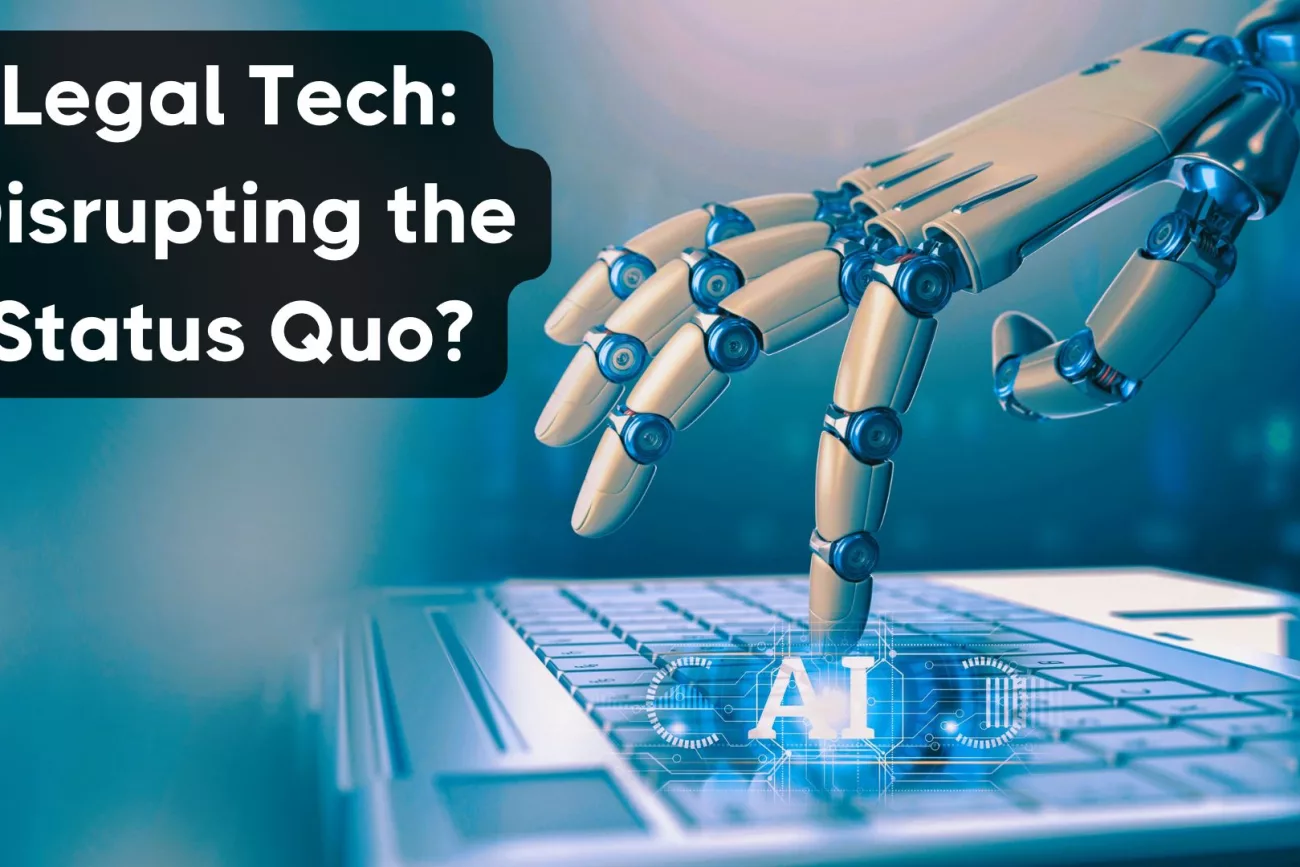
Key Points:
- The rise of legal tech startups is reshaping the legal profession through AI and digital tools.
- Explore the global perspectives, judicial impact, and client experiences in this legal tech revolution.
- Controversial debates surround job security, quality of legal services, and the future of legal education.
- Join the conversation on the ethical dilemmas and the potential for a tech-driven legal landscape.
🎯 Legal Tech Startups: AI Disruption in the Legal Profession ⚖️
The legal profession, an industry steeped in tradition and bound by precedent, is undergoing a transformation. Thanks to the emergence of legal tech startups, artificial intelligence (AI) and digital tools are starting to streamline processes, automate tasks, and offer innovative services. This shift has the potential to redefine how legal services are provided and consumed.
🚀 Justpoint: AI-Powered Efficiency for Personal Injury Claims 💼
Justpoint, a startup founded by Victor Bornstein, is leading the way with AI in the realm of personal injury law. The company has collected over 300,000 historical claims and uses this data to create a model that scores a law firm’s success rate with cases like sexual assault, medical malpractice, and product liability.
The novel approach allows lawyers to identify potentially successful claims and make their work more efficient. Rather than settling quickly for a lower amount, lawyers can take their time to fully pursue a claim, confident in the data-driven insights Justpoint provides. The company only earns when the lawyer wins their case, aligning their incentives with those they serve.
Justpoint, after securing $7.9 million in funding, is banking on the idea that data will be the future tool for personal injury lawyers.
🕊️ New Era ADR: Streamlining Dispute Resolution ⚙️
New Era ADR is another disruptor in the litigation and dispute resolution sector. They have developed a digital and virtual tool designed to cut down both the time and cost of resolving disputes by up to 90%. Through managing case intake, payments, scheduling, and facilitating virtual meetings with arbitrators, New Era ADR can deliver binding resolutions in just 60 days.
Having raised $6.3 million in total funding, New Era ADR is poised to shake up the $250 billion litigation and dispute resolution industry by refocusing litigation on storytelling and facts, minimizing unnecessary gamesmanship.
🌐 A Growing Trend 📈
Justpoint and New Era ADR are not alone in their quest to digitize the legal profession. Other startups like Zero Systems, Ex Parte, and Common Paper have also bagged millions in funding to develop AI-powered tools that automate workflows, predict litigation outcomes, and streamline contract management, respectively.
This wave of legal tech startups represents a dramatic rise in the sector, signaling the industry’s growing hunger for digital transformation. Zack Hutto, director of advisory within Gartner’s legal and compliance practice, notes that “corporate law spending is up 50% and we are projecting budgets will make a three-fold increase by 2025.”
🤔 Implications for the Legal Profession ⚠️
The emergence of these startups signals a shift in the legal profession, which has traditionally been slow to embrace technological advancements. As AI and automation become more prevalent, the industry will need to adapt.
However, while these tools offer promising benefits, skepticism remains about their transformative potential. As the industry navigates this digital transformation, striking a balance between efficiency gains from these technologies and maintaining the integrity and quality of legal services will be crucial.
The rise of legal tech startups presents both opportunities and challenges for the legal profession. As AI continues to disrupt this industry, it will be fascinating to see how these tools reshape the landscape of legal services.
🤖 AI: An Unstoppable Force or Unwanted Intrusion?
Legal tech startups like Justpoint and New Era ADR seem to be on an unstoppable path of disrupting the traditional legal industry. Their use of AI and other technologies to streamline legal processes and reduce costs is indeed innovative. Yet, it raises several questions that have sparked heated debates among legal professionals and SMEs.
💼 Jobs at Stake?
One of the biggest concerns is job security. As AI-powered legal tech becomes more prevalent, there are fears that automation could lead to job losses in the legal sector. After all, if AI can efficiently handle tasks traditionally performed by paralegals or junior attorneys, will these roles become redundant?
For instance, Justpoint’s AI system can process and evaluate the potential of personal injury cases, a task that would typically require a team of legal professionals. If such technology becomes widespread, could it lead to a decrease in demand for legal professionals?
⚖️ Quality of Legal Services
Another significant concern is the potential impact on the quality of legal services. While AI and automation can increase efficiency, there’s a question of whether they can match the nuanced understanding and judgement that human legal professionals bring to their work.
New Era ADR’s tool, for example, aims to reduce the time and cost of dispute resolution by up to 90%. But can an automated system truly capture the intricacies and complexities of a legal dispute? Can it provide the same level of quality as a human arbitrator or mediator?
🌐 A Global Phenomenon
The rise of legal tech startups isn’t just a US trend. It’s happening globally, and the response has been mixed. In some regions, these startups are welcomed as much-needed disruptors, bringing innovation to a traditionally conservative industry. In others, they’re seen as unwelcome intruders, threatening the livelihoods of legal professionals and the integrity of the legal system.
🚀 The Future: A Brave New World or a Step Too Far?
As we look to the future, the legal tech startup trend shows no signs of slowing down. However, the controversy surrounding it remains. Will AI and automation enhance the legal profession or diminish it? Will they make legal services more accessible and affordable, or will they compromise the quality of those services?
These questions are at the heart of the ongoing debate. As legal tech continues to evolve, the industry will need to grapple with these issues and find a balance that embraces innovation while upholding the values and standards of the legal profession.
💥 The Impact on Legal Education: Opportunity or Obstacle?
The rise of legal tech startups has sent shockwaves through legal education as well. Traditionally, law schools have focused on teaching foundational legal principles and skills like legal research, writing, and advocacy. But with the advent of legal tech, there’s a growing demand for tech-savvy legal professionals.
So, should law schools adapt their curricula to include legal tech education? Or would this shift away from traditional legal education dilute the quality of legal training and produce graduates who are more technologists than lawyers?
- 🏫 On one hand, integrating legal tech into legal education could better equip future lawyers to navigate a tech-driven legal landscape. It could make them more competitive in the job market and enable them to provide better services to their clients.
- 📚 On the other hand, legal tech education could divert attention and resources away from teaching essential legal skills. It could also lead to a generation of lawyers who rely too heavily on technology and lack a deep understanding of the law.
This is a hotly debated topic with no easy answers. As legal tech continues to evolve, so too will the debate over its place in legal education.
⚡ The Ethical Quandary: Progress or Pandora’s Box?
As with any disruptive technology, legal tech also raises numerous ethical issues. For instance, AI systems like the ones used by Justpoint and New Era ADR rely on vast amounts of data to function. But where does this data come from, and how is it used?
- 🕵️♂️ In the case of Justpoint, it has collected over 300,000 historical claims to train its AI system. But what about the privacy of the individuals involved in these claims? And what measures are in place to prevent misuse of this data?
- 💼 Similarly, New Era ADR’s tool facilitates virtual meetings with arbitrators and manages case intake, payments, and scheduling. But can clients trust this tool with their sensitive legal information? And what happens if there’s a data breach?
These concerns are not just theoretical. They’re very real and have significant implications for client confidentiality and privacy. As legal tech continues to advance, the legal industry will need to grapple with these and other ethical issues.
🔬 Legal Tech Startups Outside the US: A Comparative Perspective 🌍
The rise of legal tech startups is not limited to the United States. It’s a global phenomenon that is shaping the legal landscape in different jurisdictions. However, the reception and adoption of legal tech vary across countries due to differences in regulations and cultural attitudes towards technology.
In some countries, legal tech startups are welcomed as innovative disruptors that bring much-needed efficiency and accessibility to legal services. For example, in the United Kingdom, the Legal Services Act of 2007 paved the way for the liberalization of the legal market, encouraging the entry of new players, including legal tech startups. As a result, the UK has become a hotbed for legal tech innovation, with London being home to numerous legal tech startups and initiatives.
On the other hand, certain jurisdictions may have stricter regulations or cultural resistance to the adoption of new technologies in the legal profession. In some European countries, the legal profession is heavily regulated, making it challenging for legal tech startups to navigate the complex regulatory landscape. Additionally, cultural attitudes towards technology and skepticism about AI’s role in legal decision-making can hinder the widespread adoption of legal tech solutions.
Exploring the comparative aspects of legal tech startups in different jurisdictions can shed light on the opportunities and challenges they face. It also offers insights into the regulatory frameworks and cultural factors that influence the growth and acceptance of legal tech worldwide.
👩⚖️ The Role of the Judiciary and Policy Makers in the Legal Tech Revolution 📜
In the legal tech revolution, judges and policy makers play a crucial role in shaping the regulatory framework and policies that govern the use of AI and other technologies in the legal profession. They are responsible for interpreting and enforcing the laws and regulations that determine the boundaries and ethical considerations surrounding legal tech.
As legal tech startups develop AI-powered tools that automate legal processes and decision-making, questions arise regarding the reliability, transparency, and fairness of these technologies. Judges, in their role as arbiters of justice, need to critically assess the use of AI in legal proceedings, ensuring that it aligns with legal principles and safeguards against biases.
Policy makers also face the task of keeping up with the rapid advancements in legal tech and formulating policies that strike a balance between promoting innovation and protecting the interests of all stakeholders. They must consider the ethical implications, data privacy concerns, and potential disruptions to traditional legal practices.
The perspective of judges and policy makers on legal tech can vary. Some may embrace these technological advancements, recognizing their potential to enhance access to justice, reduce costs, and improve efficiency. Others may approach legal tech with caution, mindful of the need to uphold the integrity and fundamental principles of the legal system.
💼 The Client Perspective: How Are Legal Tech Startups Changing the Experience for Clients? 🧑💼
Legal tech startups have the potential to transform the client experience by making legal services more accessible, efficient, and cost-effective. Clients are increasingly benefiting from the use of digital platforms, online legal research tools, and AI-powered solutions that streamline legal processes.
For clients, legal tech startups offer advantages such as:
- Accessibility: Digital platforms and online legal services provide clients with easy access to legal information and resources, allowing them to make more informed decisions and find affordable legal solutions.
- Efficiency: Automation of repetitive tasks and document management simplifies and accelerates legal processes, saving clients time and money.
- Cost-effectiveness: By leveraging AI and technology, legal tech startups can offer more affordable services, making legal representation and advice accessible to a broader range of clients.
However, it’s essential to consider the potential drawbacks and challenges. Clients may have concerns about data privacy and security when using online platforms, as well as the level of personal interaction and trust in a digitally mediated
🗣️ Your Thoughts?
This is a hotly contested topic, and we want to hear your thoughts. Are legal tech startups a boon or a bane for the legal profession? Do they represent an exciting future or a worrying trend? Share your thoughts in the LinkedIn comments, and let’s get the conversation started!
And don’t forget to sign up for our newsletter to stay updated on the latest in legal tech and other industry trends.














